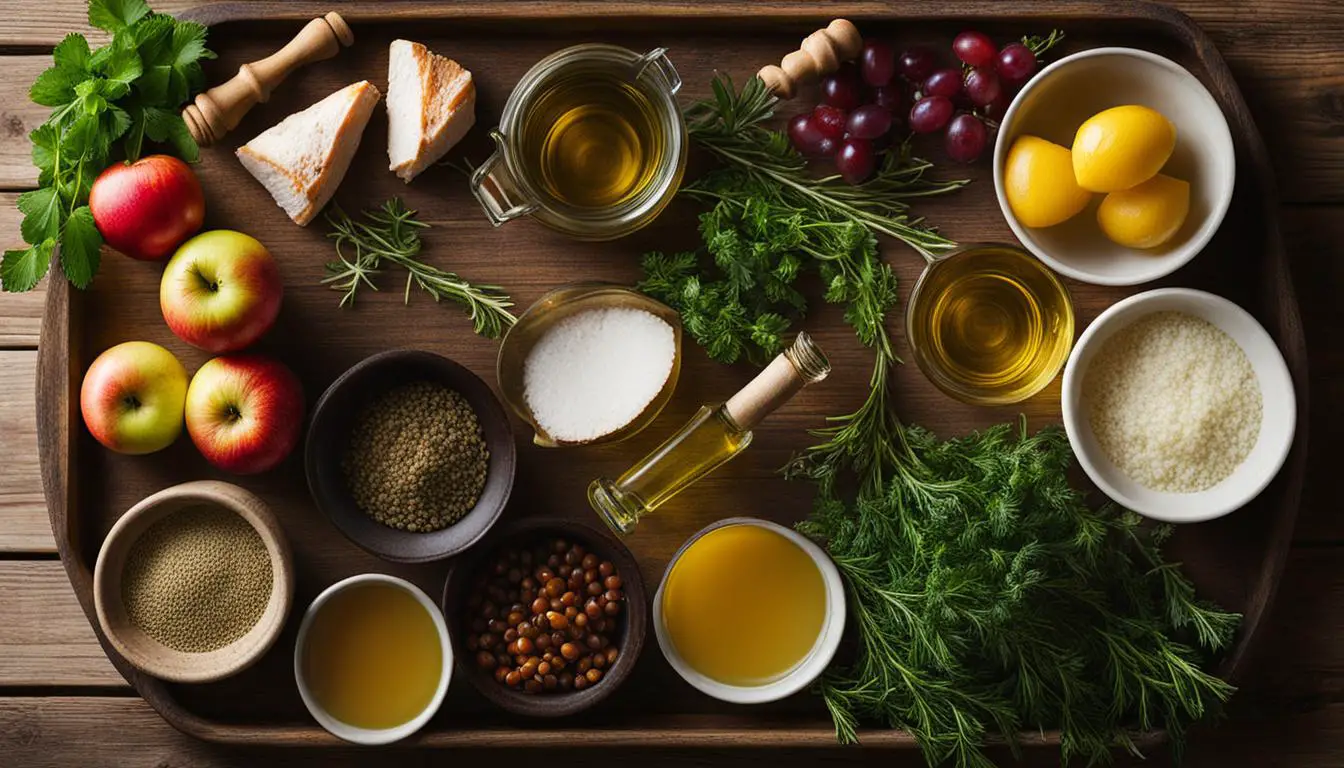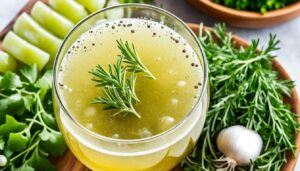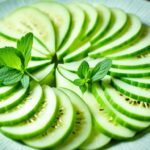Originally posted on December 13, 2023 @ 9:24 pm
Sherry is a beloved ingredient in many recipes, adding depth and flavor to dishes. But what if you don’t have sherry on hand or prefer a non-alcoholic option? In this article, we will explore the best substitutes for sherry in cooking, providing you with a range of options to keep your recipes flavorful and delicious.
Whether you’re looking to replace sherry in soups, sauces, or stews, we’ve got you covered. From alcoholic alternatives like dry white wine and brandy to non-alcoholic alternatives like vinegars and fruit juices, you’ll find the perfect substitute for your cooking needs.
Contents
- 1 Understanding Cooking Sherry and its Substitutes
- 2 Alcoholic Substitutes for Cooking Sherry
- 3 Non-Alcoholic Substitutes for Cooking Sherry
- 4 Cooking Sherry in Different Recipes
- 5 Taste Profiles of Cooking Sherry Substitutes
- 6 Frequently Asked Questions About Sherry Substitutes
- 7 Understanding Cooking with Sherry and Sherry Alternatives
- 8 How to Choose the Right Sherry Substitute for Your Dish
- 9 Tips for Cooking Without Sherry
- 10 Incorporating Sherry Alternatives Into Your Cooking
- 11 Conclusion
- 12 FAQ
- 12.1 What can I use as a substitute for sherry in a recipe?
- 12.2 Can I use non-alcoholic substitutes for sherry in my recipes?
- 12.3 How do I substitute sherry in specific dishes?
- 12.4 What are the taste profiles of sherry substitutes?
- 12.5 How do I choose the best sherry substitute for my dish?
- 12.6 How can I cook without sherry?
- 12.7 How can I incorporate sherry alternatives into my cooking?
- 13 Source Links
Key Takeaways:
- There are plenty of substitutes for sherry in cooking, both alcoholic and non-alcoholic.
- Dry white wine, brandy, and dry vermouth are excellent alcoholic alternatives to sherry.
- Vinegars like apple cider vinegar and red wine vinegar can provide a tangy flavor similar to sherry.
- Non-alcoholic options such as chicken stock and fruit juices can add depth and sweetness to your dishes.
- Experiment with different substitutes to find the perfect flavor profile for your recipes.
Understanding Cooking Sherry and its Substitutes
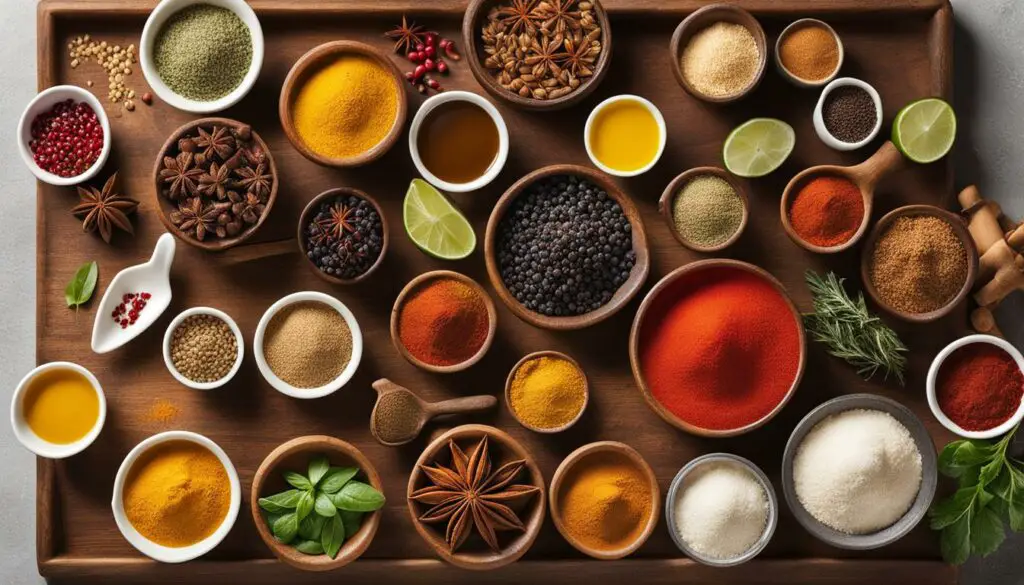
Cooking sherry is a type of fortified wine specially made for use in cooking. Unlike drinking sherry, which is meant to be enjoyed on its own, cooking sherry is specifically crafted to enhance the flavors of dishes.
However, there are various reasons why you might want to replace sherry in your recipes. Whether you are looking for non-alcoholic alternatives or want to explore different flavor profiles, there are plenty of options to consider.
In this section, we will explore the different types of sherry and its substitutes, helping you understand the alternatives available to replace sherry in your cooking. By becoming familiar with the variety of options, you can confidently choose the best substitute for your recipes and achieve delightful flavors.
The Different Types of Sherry
Sherry comes in different varieties, each with its own unique characteristics:
| Type of Sherry | Description |
|---|---|
| Fino | A pale and dry sherry with a light, crisp flavor. |
| Manzanilla | Similar to Fino, but specifically from the coastal town of Sanlúcar de Barrameda in Spain. |
| Amontillado | A medium-dry to medium-sweet sherry with a nutty flavor. |
| Oloroso | A rich and full-bodied sherry with a deep amber color and a slightly sweet taste. |
| Cream | A sweet and rich sherry typically used in desserts and sweet dishes. |
Understanding the different types of sherry can help you choose the best substitute based on the desired flavor profile of your recipe.
Substitutes for Cooking Sherry
When replacing sherry in your recipes, there are several alternatives to consider:
- Dry white wine: Dry white wine, such as Sauvignon Blanc or Chardonnay, can provide a similar acidity and flavor profile to cooking sherry.
- Vinegars: Vinegars like apple cider vinegar, white vinegar, or red wine vinegar can add a tangy and acidic flavor to your dishes.
- Broth or stock: Chicken or vegetable broth can be used as a non-alcoholic substitute, adding depth of flavor to your recipes.
- Juices and extracts: Fruit juices like apple juice or extracts like lemon juice or vanilla extract can offer a touch of sweetness without the alcohol content.
Experimenting with these substitutes can help you find the perfect alternative for your specific recipe and culinary preferences.
Alcoholic Substitutes for Cooking Sherry

If you prefer an alcoholic substitute for cooking sherry, there are several options to choose from. Whether you’re aiming to add richness or enhance the flavors of your recipes, these alcoholic substitutes can provide depth and complexity similar to sherry.
Dry White Wine
Dry white wine is a popular choice as a sherry substitute due to its crisp and slightly sweet taste. It can add a subtle flavor to your dishes, making it a versatile option for various recipes.
Brandy
Another excellent substitute for cooking sherry is brandy. It brings a distinct flavor to your dishes and can enhance the richness and depth of flavors. Just ensure to use it in moderation, as brandy can be stronger in taste compared to sherry.
Dry Vermouth
Dry vermouth is a fortified wine that offers a balanced and herbaceous flavor, making it an ideal alternative for cooking sherry. Its unique taste can infuse your dishes with a delightful complexity, particularly in sauces and marinades.
Fortified Wines – Madeira and Marsala
If you’re seeking depth and complexity similar to sherry, consider fortified wines like Madeira and Marsala. These wines undergo a similar aging process, resulting in rich flavors that can elevate your recipes. Madeira provides a nutty and earthy taste, while Marsala offers a sweeter and more robust profile.
Non-Alcoholic Substitutes for Cooking Sherry
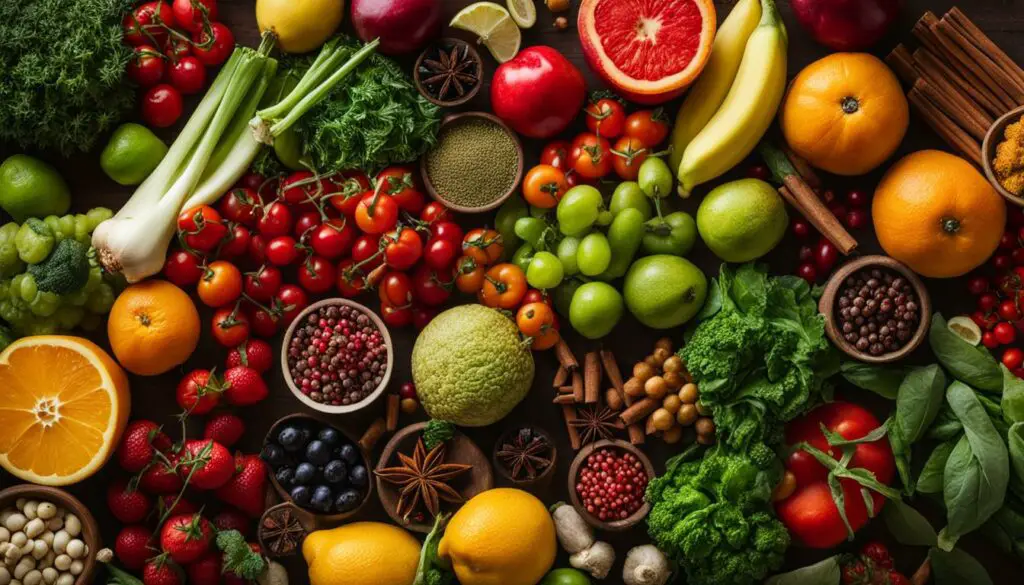
For those who prefer non-alcoholic options, there are several substitutes that can still provide a similar flavor profile to sherry. Vinegars such as apple cider vinegar, white vinegar, and red wine vinegar can be used as replacements, offering a tangy and acidic flavor.
Chicken stock or broth can also work as a non-alcoholic substitute, adding depth of flavor to your dishes. Additionally, fruit juices and extracts like lemon juice, vanilla extract, and apple juice can provide a touch of sweetness without the alcohol content.
With these non-alcoholic options, you can easily replace sherry in your recipes and still achieve the desired taste and flavor. Whether you’re making a savory sauce or a delectable dessert, these substitutes will deliver the depth and complexity that sherry imparts to your dishes. Experiment and enjoy the delightful flavors offered by these non-alcoholic alternatives for sherry!
Cooking Sherry in Different Recipes
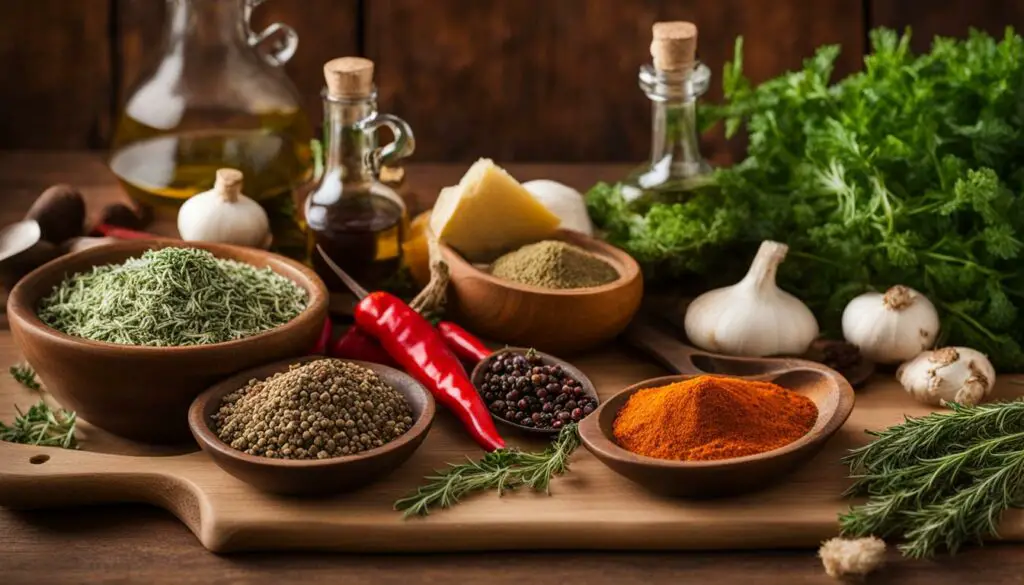
Cooking sherry is a versatile ingredient that adds depth and flavor to a wide range of recipes, including soups, sauces, stews, and desserts. However, if you don’t have sherry on hand or prefer not to use it, there are alternatives that can provide a similar taste and quality. In this section, we will explore how to substitute sherry in specific dishes and provide you with alternative ingredients to replace sherry in different recipes.
1. Soups and Sauces
When cooking soups and sauces that call for sherry, you can achieve a similar flavor by using one of the following substitutes:
- Dry white wine: This brings a crisp and slightly sweet taste to your dishes, enhancing the overall flavors.
- Chicken or vegetable broth: It adds depth and richness to the soup or sauce, providing a savory substitute for sherry.
- Vinegar: Apple cider vinegar or white vinegar can provide a tangy and acidic flavor, balancing the other ingredients in your recipe.
Experiment with different quantities and adjust to your taste preferences until you achieve the desired flavor.
2. Stews and Braised Dishes
For hearty stews and braised dishes that require sherry, consider using the following alternatives:
- Dry vermouth: It offers a slightly herbal and dry taste that complements savory dishes.
- Beef or vegetable broth: Similar to soups and sauces, broth adds depth and flavor to stews and braised dishes.
- Port wine: It brings richness and sweetness, enhancing the flavors of the dish.
Choose the substitute based on the specific taste profile you want to achieve in your stew or braised dish.
3. Desserts
Sherry is often used in desserts like trifles, cakes, and custards, adding a distinctive nutty and sweet flavor. When omitting or replacing sherry in desserts, consider these alternatives:
- Fruit juice: Lemon juice, orange juice, or apple juice can provide a subtle sweetness without the alcohol content.
- Vanilla extract: It adds a hint of richness and depth to desserts, enhancing the overall flavor.
- Almond extract: This substitute imparts a nutty flavor that can mimic the nuttiness of sherry in certain desserts.
Experiment with these substitutes to achieve the desired taste and balance in your desserts.
Remember, the quantity of the substitute may vary depending on the recipe, so start with small amounts and adjust to your taste as you go. With these alternative ingredients, you can confidently cook without sherry and still create delicious dishes that satisfy your cravings.
Sherry Replacement Ingredients for Different Recipes
| Recipe Type | Sherry Substitute |
|---|---|
| Soups and Sauces | Dry white wine |
| Chicken or vegetable broth | |
| Vinegar (apple cider or white vinegar) | |
| Stews and Braised Dishes | Dry vermouth |
| Beef or vegetable broth | |
| Port wine | |
| Desserts | Fruit juice (lemon, orange, or apple) |
| Vanilla extract | |
| Almond extract |
Taste Profiles of Cooking Sherry Substitutes

Sherry has a unique taste ranging from dry and nutty to sweet and rich. When choosing a substitute for sherry, it’s important to consider the flavor profile of the alternatives. Here are some popular options:
- Dry White Wine: Offers a crisp and slightly sweet taste, making it a versatile substitute for sherry in various recipes.
- Port Wine: Provides a rich and robust flavor, adding depth to dishes like stews and sauces.
- Marsala: Offers a sweet and caramelized taste, making it a great substitute for sherry in savory and sweet recipes.
- Vinegars: Vinegars, such as apple cider vinegar or white vinegar, can provide acidity and tanginess similar to sherry. They work well in marinades, dressings, and sauces.
- Non-Alcoholic Options: If you prefer non-alcoholic alternatives, consider using chicken stock or broth to add depth of flavor to your dishes. Fruit juices like lemon juice, apple juice, or extracts like vanilla extract can provide a touch of sweetness without the alcohol content.
Understanding the taste profiles of these substitutes will help you select the best alternative for your recipes, ensuring that the flavor of your dishes remains balanced and delicious.
Frequently Asked Questions About Sherry Substitutes
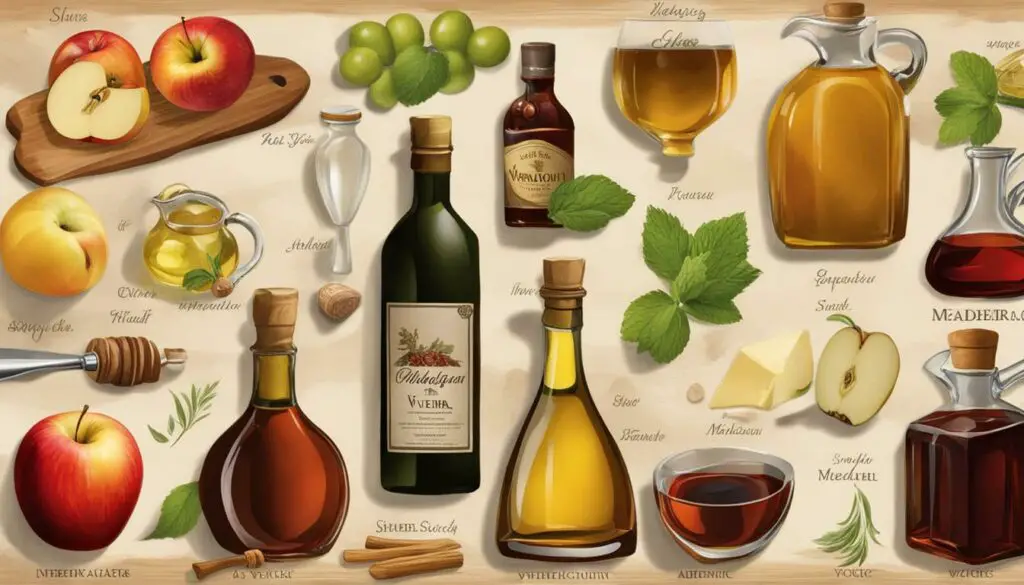
As a popular ingredient in cooking, there are often common questions and concerns about using sherry substitutes. In this section, we will address some frequently asked questions related to cooking without sherry, sherry replacement ingredients, and the use of sherry alternatives in cooking. Whether you’re unsure about the best substitute for a specific dish or need cooking tips without sherry, these FAQs will provide valuable information to enhance your culinary skills.
FAQ 1: What are some cooking tips for dishes without sherry?
When cooking without sherry, you can still achieve delicious flavors by using alternative ingredients. Here are some cooking tips:
- For a touch of acidity, replace sherry with vinegars such as apple cider vinegar, white vinegar, or red wine vinegar.
- To add depth of flavor, consider using chicken stock or broth as a substitute for sherry.
- Experiment with different fruit juices and extracts like lemon juice, vanilla extract, or apple juice to provide a hint of sweetness in your recipes.
FAQ 2: What are the best sherry replacement ingredients?
There are several sherry replacement ingredients that can mimic the flavors of sherry in your dishes. Here are some top picks:
- Dry white wine: Offers a crisp and slightly sweet taste similar to cooking sherry.
- Dry vermouth: Brings a botanical flavor to your recipes, complementing a variety of dishes.
- Brandy: Provides a rich depth of flavor, perfect for adding complexity to sauces and stews.
- Fortified wines like Madeira or Marsala: Offer a similar depth and complexity to sherry, enhancing the flavors of your dishes.
FAQ 3: Can I use non-alcoholic substitutes for sherry?
Absolutely! If you prefer non-alcoholic options, there are suitable substitutes that can still provide a similar flavor profile. Here are some non-alcoholic alternatives for sherry:
- Vinegars: Apple cider vinegar, white vinegar, or red wine vinegar can offer tanginess and acidity in your recipes.
- Chicken stock or broth: Adds depth of flavor to soups, stews, and sauces.
- Fruit juices and extracts: Lemon juice, vanilla extract, or apple juice can provide a touch of sweetness without the alcohol content.
Remember, when using non-alcoholic substitutes, adjust the quantities based on your taste preferences and the desired flavor intensity.
FAQ 4: Are there any specific dishes that can be prepared without sherry?
Absolutely! Many dishes that traditionally call for sherry can be prepared without it. Here are some examples:
| Dish | Sherry Substitute |
|---|---|
| Chicken Marsala | Dry white wine or Marsala |
| Seafood paella | Dry white wine or vegetable broth |
| Beef stir-fry | Beef broth or soy sauce |
| Mushroom soup | Mushroom broth or vegetable broth |
These are just a few examples, but with the right substitute, you can adapt many recipes to be sherry-free while still achieving delicious results.
Understanding Cooking with Sherry and Sherry Alternatives
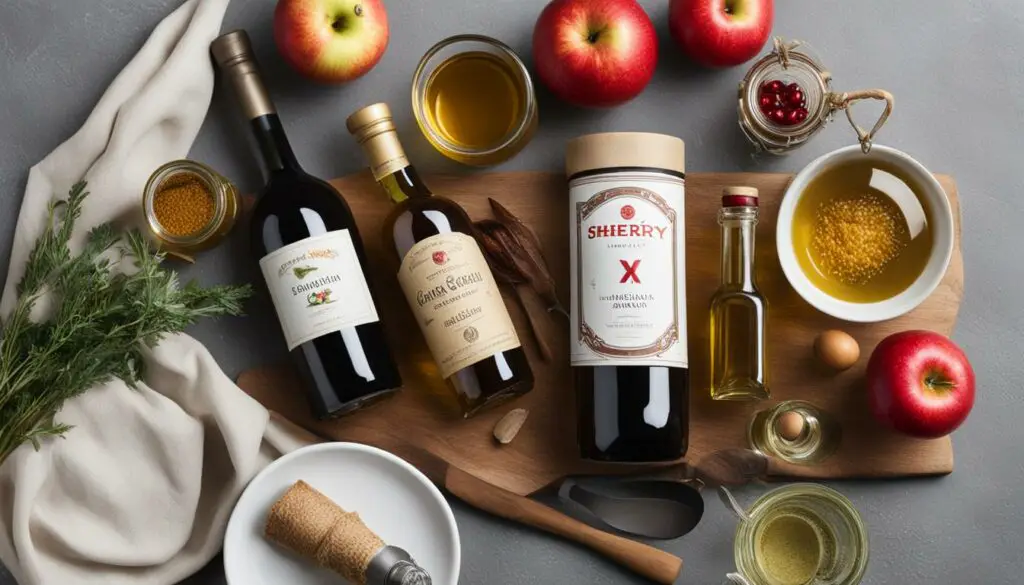
Cooking with sherry adds a unique depth of flavor to a wide range of dishes, from savory soups to delectable desserts. However, there may be times when you need to cook without sherry or prefer a sherry substitute. In this section, we will explore the differences between cooking with sherry and using sherry alternatives, providing you with valuable insights and tips for successful cooking without sherry.
Sherry alternatives offer a variety of options to suit your flavor preferences and dietary needs. Whether you’re looking for an alcoholic substitute or a non-alcoholic option, there are plenty of ingredients that can provide a similar taste profile to sherry.
When using sherry substitutes, it’s important to consider the unique characteristics they bring to your dishes. Each alternative ingredient adds its own distinct flavor, enhancing the overall taste of your recipe. By understanding the nuances of different sherry alternatives, you can choose the best option to achieve the desired depth and complexity in your cooking.
Table:
| Sherry Alternatives | Flavor Profile | Best Uses |
|---|---|---|
| Dry White Wine | Crisp, slightly sweet | Sauces, stir-fries |
| Port Wine | Rich, robust | Red meat dishes, desserts |
| Vinegars (apple cider, white, red wine) | Tangy, acidic | Marinades, dressings |
| Chicken Stock or Broth | Savory, umami | Soups, stews |
| Fruit Juices (lemon, apple) | Sweet, fruity | Baking, desserts |
Experimenting with sherry substitutes can lead to delicious and flavorful results in your cooking. Whether you’re a seasoned chef or a home cook, incorporating sherry alternatives into your recipes opens up new possibilities in the kitchen. With the right knowledge and creativity, you can achieve the desired taste and quality in your dishes, even without sherry.
How to Choose the Right Sherry Substitute for Your Dish
Choosing the right sherry substitute for your dish is crucial to maintain the desired taste and quality of your recipe. With a wide range of options available, it’s important to consider the flavor profile of your dish, as well as other factors such as availability and pricing. In this section, we will provide guidelines to help you select the best sherry substitute that complements your recipe perfectly.
Consider the Flavor Profile
When choosing a sherry substitute, it’s essential to consider the flavor profile of your dish. Think about whether you need a dry or sweet flavor, or if you prefer a nutty or tangy taste. Understanding the specific flavors you want to enhance or replicate will guide you in selecting the best substitute.
Explore Sherry Flavor Replacements
There are several options that can provide similar flavors to sherry:
| Sherry Flavor Replacements | Characteristics | Usage |
|---|---|---|
| Dry White Wine | A crisp and slightly sweet taste | Great for risottos, seafood dishes, and cream-based sauces |
| Madeira Wine | Rich and caramel-like flavor | Perfect for stews, gravies, and roasted meats |
| Apple Cider Vinegar | Tangy and acidic taste | Ideal for salad dressings, marinades, and pickling |
| Chicken Stock | Savory and rich umami flavor | Excellent for soups, braises, and pan sauces |
These options can be used as substitutes for sherry in a variety of dishes, offering different flavor profiles that can enhance your recipes.
Consider Availability and Pricing
When choosing a sherry substitute, it’s important to consider the availability and pricing of the alternative ingredients. Some substitutes may be more readily available or affordable than others, depending on your location and budget. Consider these factors when making your decision.
Experiment and have fun with different sherry substitutes to find the one that best suits your taste preferences and recipe requirements. By selecting the right substitute, you can confidently cook without sherry and still achieve delicious and flavorful results in your dishes.
Tips for Cooking Without Sherry
If you find yourself in a situation where you don’t have sherry or a sherry substitute on hand, don’t worry! There are still plenty of ways to create delicious dishes without it. Here are some useful tips and tricks for cooking without sherry:
- Adjust the seasoning: Without sherry, your dish may lack some depth and complexity. To compensate for this, make sure to season your food with herbs, spices, and other flavor enhancers to add layers of taste.
- Explore alternative flavor enhancers: While sherry adds a particular flavor to dishes, there are other ingredients that can add similar depth. Consider using ingredients like balsamic vinegar, soy sauce, Worcestershire sauce, or even a dash of red wine to achieve comparable results.
- Experiment with different cooking techniques: Sometimes, the cooking technique itself can help enhance the flavors in your dish. Try roasting, braising, or caramelizing ingredients to bring out their natural sweetness and richness.
- Utilize stocks and broths: Stocks and broths, such as chicken, beef, or vegetable, can provide a savory base for your recipes. They add depth of flavor, mimicking the umami notes that sherry would bring. Use these as substitutes in your soups, stews, or sauces.
- Pair dishes with complementary ingredients: If you’re cooking a dish that traditionally calls for sherry, think about other ingredients that can complement the flavors you’re aiming for. For example, if you’re making a savory mushroom sauce, consider using a combination of garlic, shallots, thyme, and a splash of lemon juice to enhance the earthy flavors.
By following these tips, you can still achieve delicious results in your cooking, even without sherry or its substitutes. Don’t be afraid to get creative and experiment with different ingredients to find the perfect flavor combination for your dishes.
Incorporating Sherry Alternatives Into Your Cooking
Now that you’ve found a suitable sherry substitute for your recipes, it’s time to start incorporating it into your cooking. We’re here to provide practical suggestions and guidance on how you can seamlessly integrate sherry alternatives into your favorite dishes. With a little creativity and experimentation, you can master the art of cooking without sherry while still achieving delicious and flavorful results.
One way to start incorporating sherry alternatives into your cooking is by adjusting the quantities. Since sherry adds depth and richness to dishes, it’s important to use the substitute in a way that mimics the original flavor profile. Start by using a smaller amount of the substitute and gradually adjust to taste. This way, you can achieve the desired flavor without overpowering the dish.
Another approach is to experiment with different substitutes. There are numerous options available, such as dry white wine, brandy, dry vermouth, fortified wines like Madeira and Marsala, vinegars, and even fruit juices. Each substitute brings its own unique flavor profile, so don’t be afraid to try different combinations to find the perfect match for your recipes.
Remember, cooking is all about creativity and personal preference. Don’t be afraid to think outside the box and explore new flavors and ingredient combinations.
To help you get started, here’s a simple table highlighting some popular sherry alternatives and their flavor profiles:
| Sherry Alternative | Flavor Profile |
|---|---|
| Dry White Wine | Crisp, slightly sweet |
| Brandy | Rich, fruity |
| Dry Vermouth | Herbaceous, slightly bitter |
| Madeira | Rich, caramelized |
| Marsala | Robust, sweet |
| Vinegars (apple cider, white, red wine) | Tangy, acidic |
| Fruit Juices (lemon, apple) | Sweet, fruity |
Remember, these are just a few examples, and there are many more alternatives to explore based on your personal taste preferences and the specific dish you’re preparing. Feel free to get creative and adapt the substitutes to suit your needs.
Conclusion
In conclusion, sherry is a versatile ingredient commonly used in cooking, but there are several suitable substitutes available that can provide a similar flavor profile. Whether you opt for alcoholic alternatives like dry white wine or non-alcoholic options like vinegars and fruit juices, there are plenty of options to choose from based on your taste preferences and dietary needs.
By understanding the taste profiles of sherry substitutes and following the tips and guidelines provided in this article, you can confidently cook without sherry and still achieve the desired taste and quality in your dishes. Experiment, have fun, and enjoy the culinary journey of exploring sherry alternatives in your cooking.
Remember, when selecting sherry flavor replacements, consider the unique taste profiles they offer. From dry white wine’s crisp sweetness to vinegars’ tanginess and fruit juices’ touch of sweetness, each substitute can bring a different dimension to your recipes. Additionally, try incorporating cooking tips without sherry to add depth and flavor to your dishes. With these alternatives and cooking techniques, you can create exquisite meals without compromising on taste. So go ahead, explore the world of sherry alternatives in cooking and unleash your creativity in the kitchen!
FAQ
What can I use as a substitute for sherry in a recipe?
There are several alternatives you can use as a substitute for sherry in cooking. Some options include dry white wine, brandy, dry vermouth, Madeira, Marsala, vinegars, chicken stock or broth, and fruit juices or extracts.
Can I use non-alcoholic substitutes for sherry in my recipes?
Yes, there are non-alcoholic alternatives that can provide a similar flavor profile to sherry. Vinegars such as apple cider vinegar, white vinegar, and red wine vinegar can be used as replacements. Additionally, chicken stock or broth and fruit juices like lemon juice, vanilla extract, and apple juice can provide a touch of sweetness without the alcohol content.
How do I substitute sherry in specific dishes?
When substituting sherry in specific dishes, you can use dry white wine, brandy, or dry vermouth in soups, sauces, and stews. Madeira and Marsala can be used for added richness in many recipes. Vinegars, chicken stock or broth, and fruit juices or extracts can also be used, depending on the desired flavor profile of your dish.
What are the taste profiles of sherry substitutes?
Sherry has a unique taste ranging from dry and nutty to sweet and rich. Dry white wine offers a crisp and slightly sweet taste, while port wine and Marsala provide a rich and robust flavor. Vinegars offer acidity and tanginess, while non-alcoholic options like chicken stock and fruit juices can add depth and sweetness to your dishes.
How do I choose the best sherry substitute for my dish?
When choosing a sherry substitute, consider the flavor profile of your dish. Dry white wine, brandy, and dry vermouth are suitable substitutes for soups, sauces, and stews. Madeira and Marsala can provide richness and complexity. Vinegars offer tanginess, while non-alcoholic options like chicken stock and fruit juices add depth and sweetness. Availability and pricing can also be factors to consider.
How can I cook without sherry?
If you don’t have sherry or a substitute on hand, there are still ways to create delicious dishes. You can adjust the seasoning to enhance flavors, use alternative flavor enhancers, or explore other ingredients that can add depth and complexity to your recipes.
How can I incorporate sherry alternatives into my cooking?
When using sherry alternatives in your cooking, you can adjust the quantities based on your taste preferences and the desired flavor profile. It’s recommended to start with smaller amounts and gradually increase as needed. You can also experiment with different substitutes to find the one that complements your recipe best.

